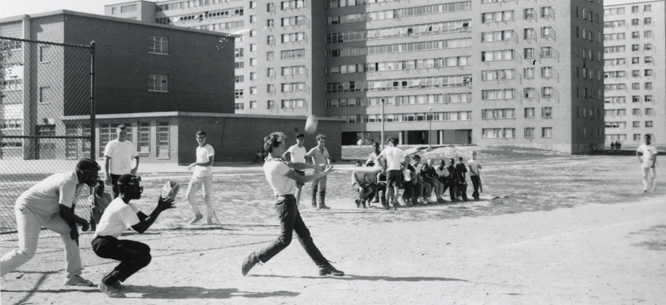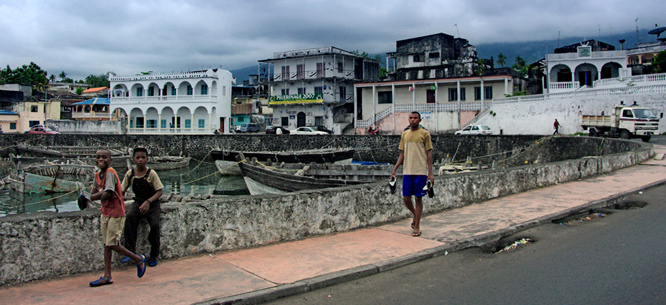TBF
TBF's JournalEnvironmentalism for the Left
From Midwestern farms to pristine suburbs to public acreage, American landscapes are a monument to a history of inequality, hierarchy, and exclusion. And they are informed at every point by moral and political conceptions of the natural world—often undemocratic in origin and effect—whose advocates tended to deny that they were political at all.
An Environmentalism for the Left
Jedediah Purdy ▪ Fall 2015
Although modern environmental politics emerged in the radical ferment of the early 1970s, leftists were suspicious from the outset of its easy mainstream appeal and its elite constituency. The same doubts persist today. The venerable Nature Conservancy’s close partnerships with corporations and focus on “ecosystem services” that can be monetized are just one reminder that environmentalism’s institutional mainstream fits comfortably with neoliberalism. Consumerist appeals to eco-consciousness (think of the local-sourcing policies and the prices of anti-union Whole Foods) suggest that environmentalism is about image and market choices. Despite decades of talk about environmental justice, the movement remains disproportionately white, elite, and motivated by romantic attachment to high mountains, old forests, and charismatic animals. Even treating climate change as an “environmental” question obscures issues of global justice—the ways that the world’s rich are much more responsible for, and less vulnerable to, the problem than the poor.
What would an environmentalism of the left look like?
It would first of all have to change its attitude to “nature.” Environmentalism is the youngest generation of a longer-running politics of nature. This politics pivots on contested visions of nature’s value, humanity’s place in it, and what, in fact, “nature” even is. From the preservationist movement that helped create national parks and wilderness areas to the awareness of ecological interconnection that inspired the anti-pollution laws of the 1970s, the politics of nature has often been democratic and creative in advancing the notion of the living world as part of a human ecology. But the politics of nature has also been an anti-politics, appealing to “nature” to shut down democratic debate ...
Much more here: https://www.dissentmagazine.org/article/after-nature-left-environmentalism-jedediah-purdy

Indian Resistance and Thanksgiving Declarations
The United States government had signed more than four hundred treaties with Indians and violated every single one.
I speak to you as a Man-a Wampanoag Man….It is with mixed emotions that I stand here to share my thoughts….The Pilgrims had hardly explored the shores of Cape Cod four days before they had robbed the graves of my ancestors, and stolen their corn, wheat, and beans….Our spirit refuses to die. Yesterday we walked the woodland paths and sandy trails. Today we must walk the macadam highways and roads. We are uniting. We’re standing not in our wigwams but in your concrete tent. We stand tall and proud and before too many moons pass we’ll right the wrongs we have allowed to happen to us….
Indian Resistance and Thanksgiving Declarations
Posted on November 17, 2014 by Howard Zinn Website
For a time, the disappearance or amalgamation of the Indians seemed inevitable—only 300,000 were left at the turn of the century, from the original million or more in the area of the United States. But then the population began to grow again, as if a plant left to die refused to do so, began to flourish. By 1960 there were 800,000 Indians, half on reservations, half in towns all over the country.
The autobiographies of Indians show their refusal to be absorbed by the white man’s culture. One wrote:
Oh, yes, I went to the white man’s schools. I learned to read from school books, newspapers, and the Bible. But in time I found that these were not enough. Civilized people depend too much on man-made printed pages. I turn to the Great Spirit’s book which is the whole of his creation….
A Hopi Indian named Sun Chief said:
I had learned many English words and could recite part of the Ten Commandments. I knew how to sleep on a bed, pray to Jesus, comb my hair, eat with a knife and fork, and use a toilet. … I had also learned that a person thinks with his head instead of his heart ...
Much more here: http://howardzinn.org/indian-resistance-thanksgiving-declarations/

Supreme Court and Labor
High court tackles four important cases involving workers, unions
by: Mark Gruenberg
November 20 2015
WASHINGTON (PAI) - From affirmative action to agency fees to whistleblower rights, a spate of worker-oriented cases either wound up before the U.S. Supreme Court in November, or are headed there, with the opposing sides laying out their positions this past month.
And while most of labor focuses on one of the looming conflicts - the agency-fee case Friedrichs vs. California Teachers Association - the others are important, too.
That's because the court, and particularly its five-man Republican-named majority, appears poised to drastically rewrite not just labor law, but working conditions in the U.S.
The class action and worker pay case ...
Details about each of the four cases here: http://peoplesworld.org/high-court-tackles-four-important-cases-involving-workers-unions/

Hitler Wasn't Inevitable - or why to vote for Bernie
It may not be enough, but in my mind it is worth a shot.
Today a great article came up in Jacobin (leftist theory publication which I read regularly) about the rise of Hitler in Germany. It could've gone different ways but we know what ended up happening. This article summarizes the attempts social democrats and some communists made in Germany as the economy failed. Bernie is making the same kind of attempt today (and I'm sure he sees these parallels as well). Let's hope he is more successful.
This is a link to excerpts I've posted in the Socialist Progressives group - http://www.democraticunderground.com/102410448
Hitler Wasn't Inevitable
(note from TBF: History repeats itself. Socialists of varying stripes trying to stop the tide in Germany. If you don't understand the rise of Trump and/or similar personalities, this article lays it out)
Beyond the official proceedings, significant historical questions remain unresolved, raising important discussions on human nature, the role of the Left, and whether progressive movements can overcome racism and other oppressions to fight together. The dominant question, of course, is how something so awful could happen in the first place. How was it possible that the most horrific crime in human history could occur in Germany, the “land of poets and thinkers?”
Hitler’s rise to power was by no means inevitable, but rather the outcome of both specific historical conditions as well as the actions (and inactions) of various social forces. While many conventional histories paint Nazism as a kind of collective German project, what Hitler’s rise to power really illustrates are the very real consequences that socialist strategy can have in a society wracked by economic depression and political polarization.
Hitler Wasn’t Inevitable
The 70th anniversary of the Nuremberg Trials is cause to reflect on the forces that failed to halt Nazism’s rise.
by Marcel Bois ~ 11/25/15
< snipped beginning of article >
The Impact of the 1929 Crisis
Just a few years before Hitler’s takeover in 1933, his National Socialist German Workers Party (NSDAP) remained largely irrelevant. It was only after the stock market crash in 1929 that their vote total jumped from eight hundred thousand in 1928 to over six million in 1930 and 37 percent of the vote in 1932, making them the largest party in parliament.
The backdrop for this rapid growth was of course the ongoing economic crisis eating away at the very foundations of global capitalism. The massive slump in investment caused by the 1929 crash led to a 29 percent decline in global industrial production by 1932. Germany’s industry was particularly hard hit, as it was financed by massive foreign (particularly American) loans, which collapsed as soon as lenders withdrew credit.
As firms large and small went bankrupt across the country, considerable sections of the middle classes were thrown into poverty. The peasantry also suffered as food prices dropped, and workers faced wage cuts averaging 30 percent. By 1933, unemployment had gone from 1.3 million in 1929 to roughly 6 million. Only one-third of workers were employed full time ...
Much more here: https://www.jacobinmag.com/2015/11/nuremberg-trials-hitler-goebbels-himmler-german-communist-social-democrats/
(And a final note: Trotsky got it and sure as hell tried: Appealing to KPD members in the pages of the Militant in 1931, Leon Trotsky summarized the German political situation as follows: If you place a ball on top of a pyramid the slightest impact can cause it to roll down either to the left or to the right. That is the situation approaching with every hour in Germany today. There are forces who would like the ball to roll down towards the Right and break the back of the working class. There are forces who would like the ball to remain at the top. That is a utopia. The ball cannot remain at the top of the pyramid. The Communists want the ball to roll down toward the Left and to break the back of capitalism.)

ETA: Borrowed from n2doc's toons:

Refugees
"The doors where closing/time hung by a hair/and that child in the arms of my grandparents./The panic was evident/And everything foretold it ... And then the cold arrived/in the middle of a hurtful glacier, an unbelievable stream of warm water: Everyone said no, and Bolivia said yes."
Refugees: That Time Everyone Said 'No' And Bolivia Said 'Yes'
Updated November 22, 201511:42 AM ET
Jasmine Garsd.
"The refugee has got to be checked because, unfortunately, among the refugees there are some spies, as has been found in other countries." It could have been said today about the Syrian refugee crisis, but those words belong to President Franklin Roosevelt, in 1940.
Back then, many of those refugees — Jews fleeing Nazism in Europe — turned to South America instead. But one by one, those countries stopped issuing visas to fleeing Jews. It was no surprise: for years Nazi and fascist ideology had incubated deep in South America.
But away from all oceans and high up in the Andes, one small South American country kept its door open — a country that has had its share of economic problems and that even today is considered part of the developing world.
Bolivia.
More here: http://www.npr.org/sections/goatsandsoda/2015/11/22/456694405/refugees-that-time-everyone-said-no-and-bolivia-said-yes

The Case for Public Housing
What is to be done? Take land off the speculative market, build housing on it, and keep it permanently affordable for anyone who might want to live there. This is being done or attempted in many cities by the community land trust movement, which puts forward a vision of community-controlled affordable housing. I wholeheartedly support that vision. I also imagine a future in which the government, instead of capitulating to the demands of real estate developers, assumes the responsibility of providing shelter itself.
Karen Narefsky ▪ November 20, 2015
When people on the left think about solutions to the housing crisis, few of us think about public housing. Faced with the twin problems of overinvestment, leading to gentrification and displacement, and underinvestment, leading to substandard housing and foreclosures, we tend to think about locally based solutions, which makes sense. Many of these problems are caused by the state in collusion with the real estate industry, and it seems impossible to imagine a future in which the government plays a different role. But I’d like to imagine a future in which many of us live in, and thrive in, public housing.
Any discussion of the future of public housing must begin by understanding its origins. Public housing in the United States first emerged in the 1930s as part of the New Deal, when there was an enormous shortage of housing following the Great Depression. The federal government began by making loans to nonprofit corporations to build housing. This program produced very few housing units, due both to the lack of qualified builders and to the inefficiency of channeling public funds through the limited-dividend corporations. As a result, under the Public Works Administration, led by Secretary of the Interior Harold Ickes, the government decided to enter the housing business: rather than paying companies to build government-subsidized housing, the state would build and maintain housing through local housing authorities.
< snip >
In its relatively short history, public housing has suffered from rampant corruption in some cities, and from the failure of many local housing authorities to maintain and repair housing projects. But this doesn’t mean public housing is a flawed concept, just as “underperforming” public schools whose students are burdened by poverty don’t serve as proof that public education is a failed endeavor. Public disinvestment is the first step in a now-familiar playbook that leads to privatization ...
More here: https://www.dissentmagazine.org/online_articles/case-for-public-housing-vienna-chicago

A Suitcase Full of Passports
Everybody knows about Davos men and the global elite, and of course borders exist a lot more for the poor than they do for the rich. The rich figured out how to benefit from this system, and this is why it exists.
Booked: A Suitcase Full of Passports
Timothy Shenk ▪ November 19, 2015
Timothy Shenk: One of the statistics in this book that blew my mind is that, by some estimates, there are upwards of 10 million people who are stateless in the world today.* How did that happen?
Atossa Araxia Abrahamian: This statistic is from one of the UN agencies. It’s really hard to get an exact number for obvious reasons. These people are not documented, so governments don’t really have a good grip on how many there are and where they are. It happened in many different ways. Let’s start with the Persian-Gulf countries, because those are the ones I talk about the most in The Cosmopolites. When we talk about the Gulf states we have to remember that they are quite new—they were formed in the past fifty, sixty years at the earliest. These borders were not there before, and many of these countries were British protectorates. When the borders were drawn and these states were formalized as nation-states, a lot of people didn’t sign up to register as citizens early on. Many populations in that region were nomadic, and they thought, “Why should I sign up? This is where I’m from.” But as these states‘ bureaucracies grew, it became more and more important for people to be documented. Many of those people—called the Bidoon in this region, which means “without” in Arabic—have tried to sign up since, but the Gulf States are not always so accommodating. It varies by country and it varies by person. There is a wide perception that the resistance is a form of racism or tribalism, and of these governments being really stingy. When you are an Emirati citizen, you have a house provided for you, you get a stipend, you get cash when you get married. They make Sweden look stingy. But these benefits are paid for with the oil money, and you can hardly call it a social democracy.
Shenk: A social plutocracy?
Abrahamian: Right. And the benefits are largely distributed among a very, very small group of people, who are mostly related to each other. So you can see why it would not be in the state’s interest to include more people in this group.
Much more here: https://www.dissentmagazine.org/blog/booked-atossa-abrahamian-cosmopolites-global-citizen-comoros-passports

The right exploits fear for political gain
The fact that governors don't have the power to ban refugees from their states--under the United States Refugee Act of 1980, it's the president who is authorized to accept refugees--didn't stop the ludicrous posturing. "There is a close collaboration with governors and mayors and community leaders about the capacity of the area for refugees and where they can go, but once they have legal status, you cannot impede their transit between different states," Lucy Carrigan, a spokeswoman for the International Rescue Committee, told the Washington Post.
Nicole Colson reports on the response of the U.S. political elite after the Paris attacks.
November 19, 2015
AMID THE outpouring of grief following the November 13 attacks in Paris, U.S. politicians and the media are, true to form, asking the question they always ask: What can we get out of it? How do we turn a tragedy into an opportunity for narrow-minded political gain? The answer, it turns out, is a hefty dose of xenophobia and racism about the supposed threat if refugees and asylum seekers are allowed to relocate to the U.S.
Never mind that the U.S. has pledged to take a pitifully small number of those risking their lives to escape violence. Some 800,000 refugees and migrants, largely from Syria, Iraq and Afghanistan, have fled to Europe this year, while according to the New York Times, as of September 2015, the U.S. had accepted just 1,854 Syrian refugees.
< snip >
Those basic facts haven't stopped a wave of Republican politicians from posturing about the threat of terrorism from refugees, particularly from Syria. As of November 18, 29 governors had released statements to that effect. Texas Gov. Greg Abbott was typical. In a letter to Barack Obama, Abbott said his state would refuse to participate "in any program that will result in Syrian refugees--any one of whom could be connected to terrorism--being resettled in Texas." ...
More here - http://socialistworker.org/2015/11/19/the-right-exploits-fear-for-political-gain

Profile Information
Gender: FemaleHometown: Wisconsin
Current location: Tejas
Member since: Thu Jan 17, 2008, 01:44 PM
Number of posts: 32,049
